Metal detecting is typically synonymous with treasure hunting, and the most desirable item people associate with treasure is gold. This precious metal is one of the most valuable resources you can find during your metal detecting expeditions; the only question is, can a metal detector detect gold and, if so, how well?
Metal detectors can detect gold. In fact, as a highly conductive, ferrous metal, gold is one of the most accessible materials for metal detectors to find. However, while all metal detectors can find gold, some are better suited to the task than others.
This article will discuss the factors that play into a metal detector’s ability to find gold. As you keep reading, you’ll learn what type of metal detector is best for this objective, at what depth these metal detectors can find gold, and how the proper frequency setting can aid in your search.
You’ll also find a list of the top metal detectors on the market for detecting gold.

What Kind Of Metal Detector Can Detect Gold?
Table of Contents
To some degree, all metal detectors can find gold, but the most efficient types for detecting it are very low frequency (VLF) and pulse induction (PI) metal detectors. The best metal detector for detecting gold is a pulse induction machine.
For instance, VLF metal detectors are a favored choice amongst beginner metal detectorists or those with limited funds, as they are significantly cheaper than PI metal detectors. They are also easier to use, can be used in various terrain and conditions, and are extremely sensitive to gold.
However, gold isn’t the only material these metal detectors are sensitive to; they are also susceptible to minerals within the soil, posing a significant challenge for detecting gold by creating false signals.
PI metal detectors aren’t inhibited by mineralized soil and can therefore detect gold at extensive depths with surprising accuracy. The biggest obstacle with these metal detectors is that they tend to be much pricier than VLF metal detectors but are often well worth the investment, which is why an increasing number of gold hunters are opting for PIs over VLFs.
Gold is highly sought after by nearly every metal detector, but without the right equipment, none stand a chance of finding it even a few inches below the surface.
Deciding which choice is best for your metal detecting needs depends on your budget, where you are metal detecting for gold, and the gold’s assumed depth.
For more tips on gold detecting with your metal detector, check out the post: 9 Gold Detecting Tips For Finding More Gold With A Metal Detector.
How Deep Can A Metal Detector Detect Gold?
The depth at which a metal detector can find gold largely depends on the type of metal detector used and the gold’s size. On average, a metal detector can detect a single grain nugget of gold buried 1-2 inches deep. Detectors can signal nuggets the size of a matchhead at a 3-5 inches depth.
A critical factor to keep in mind when metal detecting for gold isn’t just the type of detector you use or even the location, but how deep the gold is likely to be buried beneath the earth. The closer it is to the surface, the easier it is to find, but how far can most metal detectors detect gold?
Obviously, the larger the piece of gold measures in size, the stronger signal it will emit and the easier it will be for the metal detector to find. Some of the most advanced PI metal detectors can discover gold buried 2-3 feet deep. Still, many VLF metal detectors can provide similar results, particularly when paired with a powerful coil.
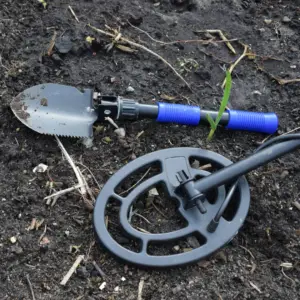
When searching for gold, you’ll want to consider the coil size, as this will affect the search depth. Typically, a larger search coil will provide better search coverage and depth, allowing you to find large gold nuggets buried deep, but this can also reduce its sensitivity.
As a result, large search coils will easily overlook smaller pieces of gold that a smaller search coil could find with ease. So while everyone wants to find those large nuggets of gold worth thousands, sometimes it’s better to opt for a smaller coil and find several smaller pieces instead.
What Is The Best Frequency For Detecting Gold?
The ideal frequency for metal detecting gold is 14 kHz, sometimes ranging as high as 17 to 70+ kHz. A higher frequency increases success in finding highly conductive and ferrous metals, like gold.
Using the right frequency for signaling gold can make or break your success in metal detecting for gold. Operating your metal detector at a lower frequency might still allow you to find large nuggets of gold buried a few inches deep. Still, these settings are preferable for finding nonferrous metals with low conductivity, like iron or stainless steel.
Best Metal Detectors For Gold
Finding gold all comes down to having the proper tools! To some degree, every metal detector can find gold, but a select few are better suited for the task than others. Each option has its pros and unique features that might render one the optimal choice for you.
The best metal detectors for gold currently on the market include:
- Minelab Gold Monster 1000
- Fisher Gold Bug Pro Metal Detector
Suppose you’re searching for a metal detector that can find gold with exceptional success without breaking the bank. In that case, the Fisher Gold Bug Pro is the option, as this budget-friendly metal detector is guaranteed to find gold at a significantly higher success rate than any other metal detector of equal price.
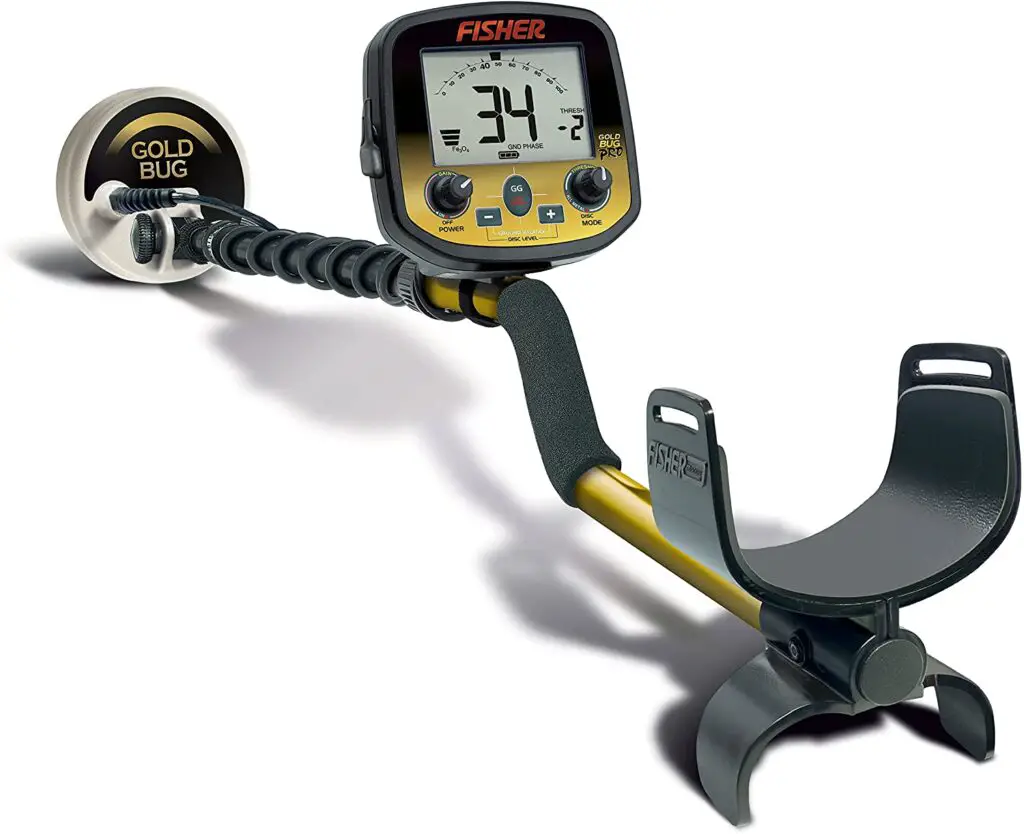
If you prefer unlimited possibilities for your metal detecting terrain and environments, spending an extra two hundred or so for the XP ORX may better suit your needs. Its waterproof search coil and pinpointer will ensure your gold hunting ambitions are not restricted by a few inches, feet, or water.
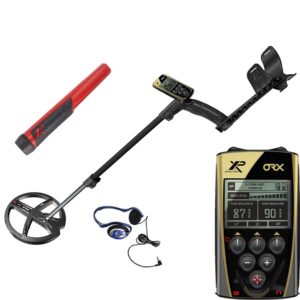
Minelab’s Gold Monster 1000 is another excellent option; this metal detector’s ingenious design can detect gold and other materials buried several feet beneath the surface without sacrificing sensitivity. This technology helps ensure no speck or nugget of gold goes undetected regardless of size.
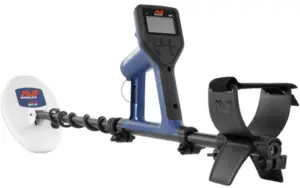
Finally, the Garrett ATX Pro Deepseeker is our top-of-the-line recommendation for gold hunters with a limitless budget. While this metal detector far exceeds the previous options in price, it comes with incomparable features, such as:
- Submersible up to 10 feet of water
- Emits a Maximum Frequency of 730 Pulses Per Second
- Enhanced 20″ DD search coil
- Military-grade Garrett hard case
- Advanced Ground Balance and Iron check
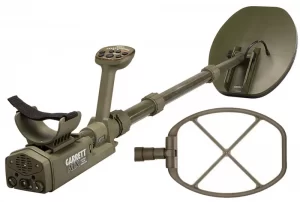
The Garrett ATX Pro Deepseeker uses pulse induction technology, amongst other impressive features, to help metal detectorists find every speck of gold for years to come.
Can A Metal Detector Detect God Summary
Suppose you’re considering pursuing metal detecting as a hobby or even a career in pursuit of gold. In that case, you’ll be happy to learn that nearly every metal detector can find this precious metal.
Still, suppose you want to find gold with consistent success and ease. Invest in the right equipment, such as a PI metal detector paired with a properly-sized coil and set at a high frequency (above 14 kHz). Or, invest in one of the metal detectors recommended above that will have you digging up gold in no time.


